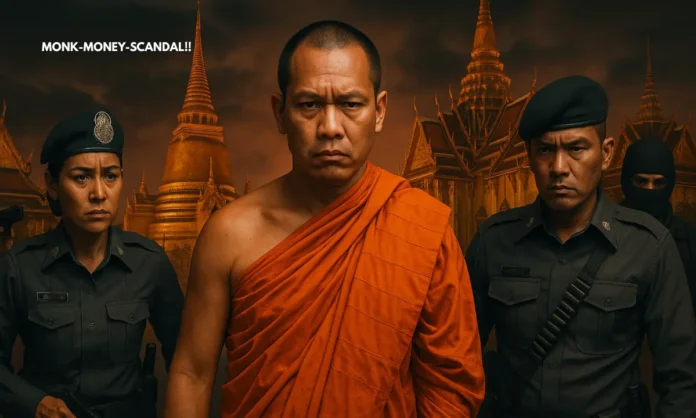SUMMARY
– A senior Bangkok monk’s disappearance uncovered a sprawling sex-and-blackmail ring involving multiple clergy members, luxury gifts, and temple finances.
– At least nine monks have been defrocked or dismissed as police investigate extortion, embezzlement, and religious hypocrisy.
– The scandal has reignited national debates over clerical power, gender scapegoating, and the urgent need for Buddhist institutional reform.
The Collapse of a Sacred Illusion
When Phra Thep Wachirapamok vanished from his temple in central Bangkok, few anticipated the seismic revelation it would trigger. What began as a routine investigation into a missing senior monk has spiraled into a national reckoning over the opulence, power, and moral decay plaguing Thailand’s Buddhist clergy. The arrest of 36-year-old Wilawan Emsawat—charged with extortion, money laundering, and possessing stolen goods—ripped the saffron veil off a web of intimate liaisons, blackmail, and lavish indulgences spanning Thailand’s revered temples.
As police combed through Wilawan’s residence, they uncovered mobile phones containing tens of thousands of compromising images and videos—many implicating senior monks. Investigators say nearly 385 million baht ($11.9 million) flowed into her accounts over three years, with direct financial ties traced to temple networks. The scale of what’s been unearthed is staggering—but the more disturbing truth may lie in how long this misconduct was able to thrive under a facade of sanctity.
Six senior monks in Thailand have been defrocked … after authorities uncovered tens of thousands of pornographic images and videos allegedly featuring a woman in sexual acts with high-ranking clergy – a scandal that has rocked the kingdom’s conservative Buddhist establishment. pic.twitter.com/ZFfi0u3e5X
— Eddie Du (@Edourdoo) July 15, 2025
Secrets, Seduction, and the Fall of the Monks
- Police found financial links between temples and Wilawan, including a Mercedes and “millions” in bank transfers.
- Wilawan admitted to relationships with monks and a religious professor, saying she “fell in love.”
- Nine monks have been defrocked so far; investigations into embezzlement and misconduct are ongoing.
The true shock isn’t that Thai monks broke their vows—it’s how routine such breaches seem. In one instance, a senior monk implicated in the scandal admitted to “loaning” temple funds to Wilawan to help her with business, a claim that stretches credibility thin. Yet what’s arguably more telling is how the public narrative has unfolded. While Wilawan now sits in custody, it is she—not the powerful men whose trust she gained and then allegedly extorted—who has faced the fiercest criticism.
“There’s been first-class science to get us to where we are,” one commentator opined in a completely different context. But here, too, the science of power, lust, and moral erosion has reached a sophisticated—and tragic—peak.
Gendered Hypocrisy and the Privilege of the Robe
- Critics say monks enjoy unchecked influence and lavish donations despite vows of asceticism.
- Commentators argue that women bear the brunt of public scorn, even when exposing institutional rot.
- New laws are being considered to curb temple misconduct and restore faith in the clergy.
The Bangkok Post’s Sanitsuda Ekachai didn’t mince words: “When the clergy’s moral decay is in full view, it’s the woman who takes the fall while the monks are cast as victims.” This indictment echoes through recent editorials and public sentiment as the Thai state scrambles to do damage control. A Facebook hotline has been launched to report monk misconduct, and a dormant bill criminalizing the defamation of Buddhism is being revived. Even King Maha Vajiralongkorn has intervened, rescinding ecclesiastical honors from dozens of senior monks.
Yet none of this addresses the deeper question: How did a monastic institution entrusted with the spiritual compass of a nation become so entangled in lust, greed, and systemic silence?
From Reverence to Reckoning
Thailand’s temples have long stood as towering symbols of moral order in a nation of deep faith. But this scandal may permanently shift that perception. While many Thais will continue to believe in Buddhism’s teachings, fewer may trust the men who wear its robes.
In Paiwan Wannabud, a former monk turned social commentator, we find a sobering voice of clarity: “They were lost to their passion and their lust.” The loss isn’t just moral—it’s institutional, cultural, and generational. If Thailand fails to seize this moment for meaningful reform, the next temple scandal won’t be a revelation—it will be an inevitability.


